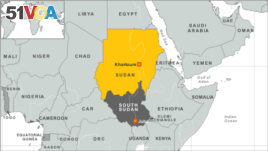August 10, 2012
South Sudan's Human Rights Commission issued its annual report this week, finding that the country has repeatedly violated its citizens' human rights during the first year of independence.
The findings covered a range of human rights, from women’s and children’s rights, to the rights to freedom and a fair trial.

Sudan - South Sudan map
Human Rights Commissioner Laurence Korbandy says some states have particularly poor records when it comes to protecting the rights of women and girls.
"In Equatoria, Upper Nile and Bahr-El-Ghazal, rights to life are grossly violated. The research findings establish that early pregnancies and early marriages are key because of the high dropout rate for the girls from schools," Korbandy said.
Seventy-two percent of South Sudanese cannot read or write, according to the report -- and the majory of those who are illiterate are women. The report further says that the goal of 25% representation of women in political and administrative jobs is not realized because of low education of women.
Human Rights Commissioner Laurence Korbandy said the government must do more to educate women.
The report also covered the ethnic clashes in Jonglei State, which left nearly one thousand people dead.
And the commission found that prisons and police cells across the country are dirty, overcrowded, and not providing enough food to inmates. These findings echo a similar report by the group Human Rights Watch.
Human Rights activist and Secretary General of the South Sudan civil society alliance, Biel Boutros Biel, said human rights activist and Secretary General of the South Sudan Civil Society Alliance, Biel Boutros Biel, has welcomed the new report by the South Sudan Human Rights Commission but says it is long overdue.
Biel said arbitrary arrests are far too common in South Sudan.
“I have been going to many police stations and you would get many people being locked in without any charges. Some of them even don’t write any statements. They are just accused, brought and put in, staying in police stations beyond 24 hours,” he said.
He called on the government to enact laws to regulate the activities of security agencies and the behavior of security guards.